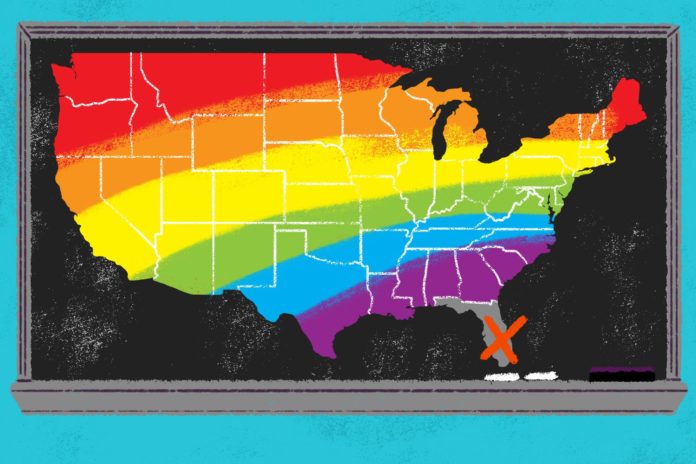/VeryWell_FL_DontSayGayBill_FINAL-0625b822b71b4713b4a926c98df2e9d5.jpg)
Key Takeaways
- Florida’s Parental Rights in Education law, which will go into effect on July 1, prohibits education on sexual orientation and gender identity from kindergarten to third grade.
- Experts say the law could have detrimental impact on the mental health and self esteem of LGBTQ+ students and teachers.
- A few states are considering passing a similar legislation based on the “Don’t Say Gay” law.
A new Florida law will ban classroom lessons on sexual orientation and gender identity for students from kindergarten to third grade. Critics have labeled the legislation as the “Don’t Say Gay” law, saying it limits freedom of expression and harms LGBTQ+ students and teachers.
Grace O’Connor, MA, LMFT, a licensed therapist who works with LGBTQ+ youth at Westwind Recovery in Los Angeles, said the Florida law effectively removes school as a “safe place” for students and teachers, and it could exacerbate already high rates of mental health struggles like depression, self harm, and suicidality among LGBTQ+ youth.
“When there’s silence, when there’s some kind of inherent shame, kids pick up on that,” O’Connor told Verywell. “There’s always going to be LGBTQ+ kids in classrooms, it’s just whether or not we’re going to have them represented.”
A recent study in the journal Pediatrics showed that adolescents who are considered sexual minorities had a higher risk of suicidality, at about 26%, than heterosexual adolescents. And according to a national survey, 42% of LGBTQ+ youth seriously considered suicide in the past year.
LGBTQ+ teachers will not be immune to the law’s impact either, O’Connor said. Teachers in same-sex marriages may have to make choices about whether to mention their partners in school settings or hide that part of their lives. That hiding and shame can also affect students, she added.
Kat Hammer, MSW, LCSW, a Florida-based social worker at Thriveworks in West Palm Beach who works with clients who have experienced trauma, including LGBTQ+ youth, told Verywell that she worries about how this law may harm children’s mental health as they mature into adults.
“Our emotional wellbeing and our mental health come from our ability to feel safe in the world,” Hammer said. “While children may not understand the details [of this law any] more than kids understanding the details of when their parents fight, I will tell you that it scares them.”
According to 2019 data from the Centers for Disease Control and Prevention on Florida high schoolers prior to the implementation of the “Don’t Say Gay” law, students who identified as gay, lesbian, or bisexual were already substantially more likely to attempt suicide, at 20.4%, than their straight peers, at 5.3%.
A Lack of LGBTQ+ Safe Spaces
O’Connor didn’t begin to learn about the histories of transgender people like herself until her late 20s, she said. There was no representation of any LGBTQ+ identities when she was in kindergarten and grade school. In this absence, she developed internalized LGBTQ+ phobias, depression, anxiety, and shame, she added.
“I didn’t even know that was a possibility, that someone could be other than cisgender and heterosexual,” O’Connor said. “Had there been a pride flag in a classroom, had there been a very general discussion of gender identity and sexual orientation, I might have gotten a clue that whoever I was perfectly OK—that there was nothing wrong with me.”
In addition to classroom restrictions, Florida’s new law requires an increase in school-to-parent communication about changes in children’s mental health–which may have varying consequences depending on students’ homelife.
Family conversations about these topics can benefit students if their family is accepting of their identities, Hammer and O’Connor said. But conversations with unaccepting families may put students in danger, further jeopardizing their ability to feel safe.
“A lot of times families might not be the first place where kids feel comfortable to express their LGBTQ+ identity,” O’Connor said. “A classroom might be the first place where they express a belief that there’s something other than heterosexual.”
According to the Trevor Project, only one-third of LGBTQ+ youth said their homes were LGBTQ-affirming, whereas 47% of transgender and nonbinary youth said they could access gender-affirming spaces at school.LGBTQ+ affirming actions like respecting people’s pronouns or allowing for legal name changes are associated with lower rates of suicide attempts among LGBTQ+ youth.
“We keep taking away these safe spaces for kids, where are they going to go?” O’Connor said. “This is something I’ve seen over and over and over again in my work that if kids aren’t given a space to explore themselves, they turn to more maladaptive means of coping.”
This can include things like self harm, drug or alcohol abuse, or obsessive compulsive tendencies, she added.
Is ‘Don’t Say Gay’ Constitutional?
Christa Ramey, JD, a trial lawyer at Ramey Law PC who specializes in school bullying cases, told Verywell the future of the law is uncertain and it has the potential to go in very different directions. It could either be overturned due to infringement on freedom of speech, or encourage more states to follow suit.
“It’s possible the law infringes on the First Amendment, just as with any law that amounts to censorship.” Ramey said in an email.
The law has already been met with opposition. Even before its signing by Governor Ron DeSantis, more than 150 major U.S. companies signed a statement opposing the legislation, where they voiced concerns about safety and inclusion for children and school employees. Some Florida students have also staged walkouts in protest of the law, as have Disney employees.
Two days after its signing, the law was met with its first legal challenge by a group of Florida parents who called the restrictions “offensive and unconstitutional,” Reuters reported.
However, the Florida law will likely garner support from other conservative states that may seek to adopt a similar legislation.
“These laws are the brainchild of conservative think tanks and are shared readily with any legislator that wants them,” Ramey said. “I would expect similar laws soon in other states, such as Florida’s neighbor Alabama.”
Alabama state representatives have introduced a bill that would ban teachings of “divisive concepts based on race or sex” in public schools, and another that would ban the use of the American School Counselor Association’s standards in public schools, according to Advocate. Numerous other states have also introduced legislation related to sexual orientation or gender identity censorship.
Texas joined the list on Monday, with Lieutenant Governor Dan Patrick saying he will make passing “Don’t Say Gay”-style legislation a top priority in the next state legislative session, the Texas Tribute reported.
Helping LGBTQ+ Youth Find a Voice in Silence
In her work at Westwind, O’Connor encourages LBGTQ+ youth to work on projects like creating a drawing of their own pride flag, or identifying music that makes them feel at home.
Ih the coming weeks, Hammer plans to open up Saturday appointment slots specifically for LGBTQ+ youth and people who feel they have been affected by the Florida law.
Finding and promoting healthy communities like LGBTQ+ centers where people can be themselves will be crucial in protecting the safety of LGBTQ+ youth and loved ones, she said.
“Neutralize the noise to the best you can,” Hammer said. “We’re limited in our abilities, but we have to listen, we have to protect, and we have to tell young people that they’re OK being who they are.”
What This Means For You
Florida’s new law, which will go into effect on July 1, will prohibit sexual orientation and gender identity education from kindergarten to K-3, which could have damaging impacts on LGBTQ+ youth as they mature. Mental health experts encourage LGBTQ+ students and their families to seek out safe spaces if they feel the affected by the law.








